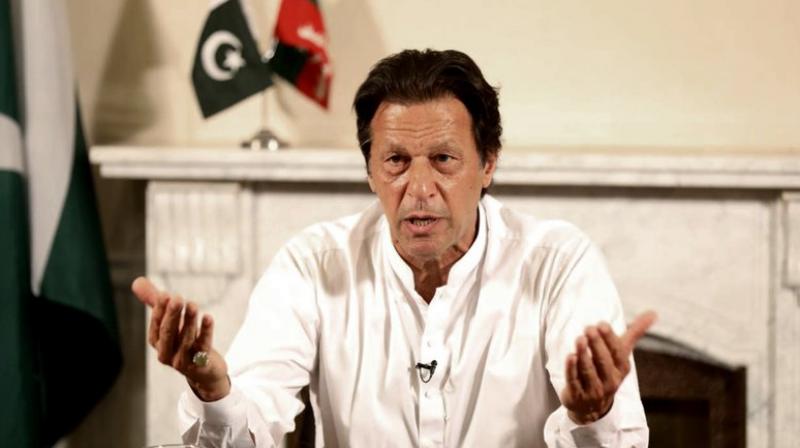View from Pakistan: Creating party watchdogs will help Imran to perform better

The transfer of power from one constitutionally mandated authority to another is taking place in a manner that has much to commend it.
The initiative taken by the PTI to seek the cooperation of other parties, including its rivals in the latest general election who are going to occupy the Opposition benches in the new National Assembly, has been widely appreciated.
This gesture is unlikely to end the rivalry between the ruling coalition and Opposition, nor should that be expected. But if it can persuade our political parties to treat one another as competitors for public favour and not as each other’s and the country’s worst enemy, and if their exchanges could be purged of offensive expletives, Pakistan’s politics could become somewhat more decent and meaningful.
The PTI leadership has held intensive deliberations over the past many days to finalise the party nominees for important constitutional offices, and to the extent the process has been truly consultative it can only be welcomed.
Pakistan has an unenviable record of the way Prime Ministers and chief ministers have been named more often than not without reference to their parliamentary parties. This started happening soon after Independence when a new government was formed following the assassination of PM Liaquat Ali Khan. Then the country’s third governor general, Malik Ghulam Mohammad, assumed the prerogative enjoyed by the Quaid-i-Azam, and arbitrarily appointed not only PMs but members of the Cabinet as well, and a helpless parliamentary party saw safety in yielding to his diktat.
It seems the public clamour about the need for political parties to democratise their functioning and decision-making has started having effect. In Balochistan, the choice of the CM designate, though he is the head of the Balochistan Awami Party, was endorsed by the members of the coalition.
In Sindh, the decision to retain the outgoing CM was made by the PPP chairman but it was endorsed by the PPP parliamentary party. In Khyber Pakhtunkhwa, a similar procedure was followed but with a difference. The PTI chief agreed to drop his first choice for chief ministership due to opposition from within the party and replace him with a person enjoying broader support.
In the present situation the PTI and PPP parliamentary parties are unlikely to question party chiefs’ choice of CMs, and their endorsement of the persons thus chosen has a token value only, but the trend towards a hallowed convention is encouraging. Now that the system of allowing the legislatures to complete their terms has been firmed up, it is possible to build healthy parliamentary conventions.
Similarly, the PTI’s offer to meet the Opposition parties’ reservations and take them along in meeting the challenges to governance could lead to a reduction in the problems a majoritarian state invariably creates. The need for moving towards a participatory democracy was recognised quite some time ago and one result was the formation of standing committees of both Houses of Parliament. The decision to offer chairmanship of the Public Accounts Committee to the Leader of Opposition in the National Assembly marked the beginning of a salutary practice.
However, the standing committees have not been able to play their due role in deepening democracy and promoting good governance, due mainly to the executive’s lack of support to them. Two instances will make the point clear. When the bill to delete the provision for life imprisonment from the blasphemy section of the Penal Code came up in the National Assembly, the recommendations of the standing committee were ignored because the government was in a hurry to get the House prorogued. The consequences have been quite serious.
The Senate standing committee that scrutinised the cybercrime bill devoted considerable time to hearing civil society’s views, but it was unable to break through the barriers against reasonableness raised by the powerful establishment. The consequences have again been undesirable. Greater care in choosing qualified persons for the standing committees, improved regularity in their working and the executive’s amenability to Parliament’s advice could strengthen a healthy convention.
It is also perhaps time to think of increasing the role of the political parties in watching over the working of their governments and parliamentary groups. Pakistan came into being at a time when separation of party and government offices was the ideal of democratic societies.
Pakistan, too, conducted a brief experiment with such an arrangement but it was given up when the Muslim League president, Chaudhry Khaliquzzaman, started putting unwelcome questions to his party’s government, headed by PM Liaquat Ali Khan. The former was made to quit his office and the latter became head of the party too. Ever since then, heads of government have been becoming chiefs of the parties too, even if their association with the party was only a few hours old.
It would be unrealistic to expect government heads in Pakistan to let their party organisations call them to account. Yet the possibilities of creating party watchdogs with limited mandates should be worth probing.
Each party, in power or in Opposition, may set up two committees, one to monitor its parliamentary members’ compliance with the party manifesto and the other one to ensure timely cognisance of any corrupt practices. That might help the growth of responsible politics.
By arrangement with Dawn
H10

